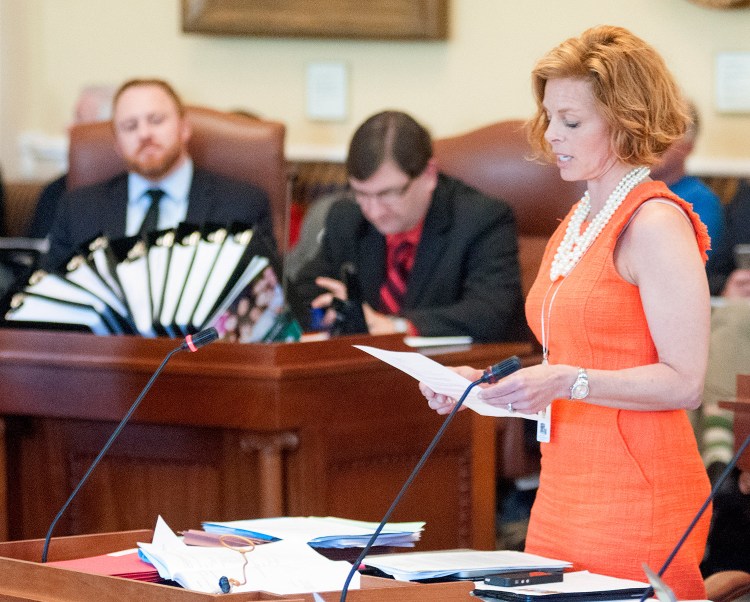AUGUSTA – The Senate took the first steps Wednesday toward restoring the mechanism that allows tipped workers to be paid at a lower rate than other hourly workers.
The mechanism, called a tip credit, was removed under a law voters approved last fall that calls for tiered increases to the state’s minimum wage.
The ballot measure that boosted Maine’s minimum wage from $7.50 an hour to $9 an hour this year and to $12 an hour by 2020 also removes the tip credit rule, which allowed employers to pay tipped workers only half of the minimum hourly wage. Restaurant owners and workers turned out in large numbers during public hearings to request the change, saying the voter-approved minimum wage hike would drive up labor costs for restaurant owners while eroding tips for servers.
Sen. Roger Katz, R-Augusta, said voters who supported increasing the minimum wage did not intend to drive down the wages for tipped workers.
“We need to fix it,” Katz said. “We are hearing that loud and clear.”
He said lawmakers who frequent restaurants in the Augusta area are hearing complaints about the tip credit on a regular basis.
“The message we are hearing from servers is, ‘Thanks for trying to help us, but you’re not helping us you’re hurting us,’” Katz said. “Please don’t do this to us.”
But lawmakers who voted against the change said the Legislature needed to respect the will of the voters and noted that other states without tip-credit laws did not see lower tips or decreased wages for restaurant workers.
“I think if we are to overturn the will of the voters we should have clear and overwhelming evidence that the action of voters have harmed our state,” said Sen. Shenna Bellows, D-Manchester. She said that while dozens of restaurateurs and wait staff testified in favor of the restoration there were also some who said the law passed by voters brought better economic security than depending on tips alone.
TIPPING THE BALANCE
Challenging the citizen-backed law created several sharp divides within the Democratic caucus of the Legislature, with lawmakers in regions of Maine heavily dependent on tourism siding with Republicans, who favored restoring the tip credit.

Senate President Michael Thibodeau hits with the gavel after a Senate vote on bill reinstating tip credit on Wednesday at the State House in Augusta. Staff photo by Joe Phelan
Roughly 55 percent of voters last November endorsed raising the statewide minimum wage, which started to take effect in January. Question 4 also increased the minimum wage for tipped workers from $3.75 to $5 an hour Jan. 1, followed by annual $1 increases until the wage hits $12 an hour in 2024.
Sen. Bill Diamond, D-Windham, who supported the restoration bill, said lobbying from opponents was vigorous and often not very civil. He said he had to rush to delete expletive-laced messages left on his home answering machine before his grandchildren accidentally heard them.
Hundreds of workers in his district, which includes the Sebago Lake tourism region, were heavily affected by the new law, he said. Other lawmakers said that some wait staff had already seen their tips decline because customers were confused about the new law and believed servers were earning enough without tips, or they were reducing their tip amounts because of it.
Sen. Amy Volk, R-Scarborough, read testimony from several waitresses who said their wages with tips were between $20 to $30 an hour but without the tip credit their incomes were declining. Volk also told the story of the 90-year-old Moody’s Diner in Waldoboro that estimated its employee payroll would increase by as much as $30,000 this year alone and by full implementation of the new minimum wage it would be forced to pay its workers an additional $300,000 a year – which it would not be able to sustain and stay in business.
“This to a 90-year-old business in the state of Maine that would really like to live to 100 years,” Volk said.
The bill, which passed the Senate on a 23-12 vote, will now move to the House. Because it has not gained the two-thirds support it needs to be enacted immediately upon the signature of the Gov. Paul LePage, it is likely the change will not go into effect until 90 days after the Legislature adjourns later this month.
That means the tip credit will not be restored until after the busy summer tourism season in Maine.
Scott Thistle can be contacted at 791-6330 or at:
sthistle@pressherald.com
Twitter: thisdog
Send questions/comments to the editors.




Success. Please wait for the page to reload. If the page does not reload within 5 seconds, please refresh the page.
Enter your email and password to access comments.
Hi, to comment on stories you must . This profile is in addition to your subscription and website login.
Already have a commenting profile? .
Invalid username/password.
Please check your email to confirm and complete your registration.
Only subscribers are eligible to post comments. Please subscribe or login first for digital access. Here’s why.
Use the form below to reset your password. When you've submitted your account email, we will send an email with a reset code.